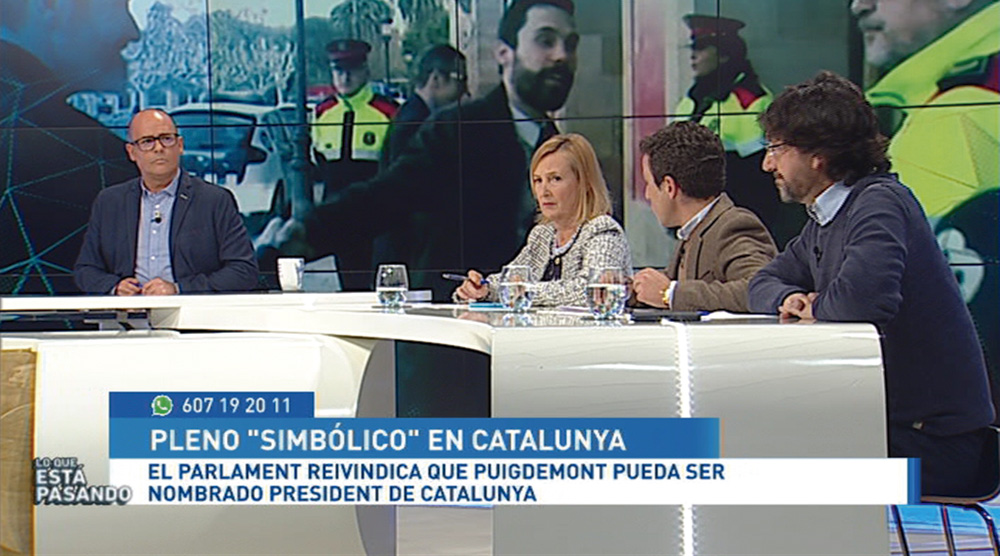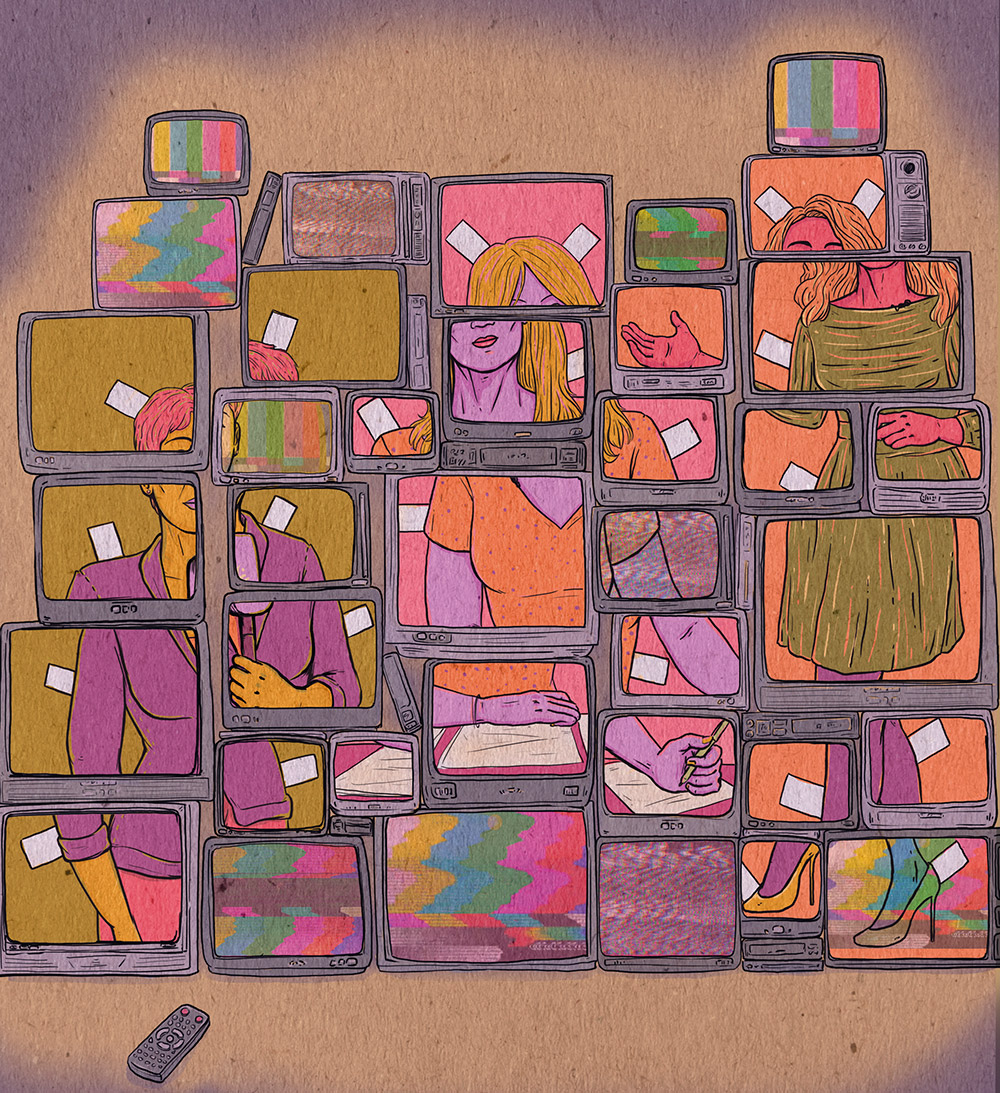Women out of play
- They are very fashionable, they are strong opinion makers: we are talking about radio and television talk shows. They speak, they speak, they speak, they speak, they speak, they speak and they raise their voices. Among the interlocutors, men stand out. Data have been provided by a research team from the UPV/EHU. ARGIA has received the opinion of several tertullians and presenters. Why are so few women invited? And why do women usually say no to invitations? What can be done to resolve the imbalance?

“I stopped being Tertullians, because it is very difficult to be there as a woman, and even more so if you want to make feminist reading” are words of journalist Zuriñe Rodríguez. After several years of talks both on television and on radio, he decided to put aside his activity. Data indicate that presence in EITB debates is neither easy nor common: According to data from the research group Visibility of Women of the UPV/EHU in the media, in the radio tertulias, for example, the presence of women does not reach a third and conversations without women are common. The participation of women in television was 35.5% in November 2017 and with the new year the data have not changed much. The session of The Klaudio Programme, for example, is far from parity: the participation of women is 26.81 per cent, and normally round tables composed of one woman and five men are held. Rodríguez has based one of his experiences on the feeling of an empty quota, the feeling of being the object of women to show supposed equality.
It's not the only cause of women's invisibility. “Women are not in the EITB tertulias and are also considered normal,” says Arantza Gutiérrez, professor and researcher at the UPV/EHU. Three professors from the UPV/EHU have analyzed the way in which the conducts that the patriarchal system in which we live assigns to women are carried out. Iratxe Fresneda, Itxaso Fernández and Arantza Gutiérrez have taken political stances as a sign. Gutiérrez is clear on the reason for focusing on the discussions of the round tables: “Today we have a lot of information and people don’t read newspapers. The tertulias decide what we have to talk about.” However, in these discussions, they realized that the absence of women was a common trend and became vigilant. “There are many tertulias, but women don’t have words. We are not in the media and that means that we are not visible.” They conclude that above all the androcentric perspective stands out. In any case, he has insisted that each part of this puzzle has a part of responsibility and that it is time for everyone to be clear what responsibility it has.
Individual responsibility
The first of the investigations began in November 2016 and it was in the same month of 2017 that it was terminated. During this time, all the television and radio tertulia programmes offered by EITB in the Basque Parliament were reviewed. According to the latest data on your website, EITB has not changed its trend. According to the study, the requirements established in Law 4/2005 for the Equality of Women and Men have only been fulfilled by two sessions in the first 31 days of the year. The female participation in the ETB1 drown aho program was 47.22% and in the ETB2 En Jake program was 40.68%.
Pilar Kaltzada,
Interlocutor:
“The code of confrontation is very masculine. It's a power struggle, and men are traditionally educated for struggle. So it’s normal for the woman to feel uncomfortable; I feel like this myself”
Pilar Kaltzada (Donostia-San Sebastián, 1970) has long collaborated “quite” in radio and television. In general, he underlined that the sessions in which he has been held have shown "some concern" about his evolution. In other words, work has been done in these groups to bring the word of women and men to the same level. “Although in some cases it is clearer, I have generally perceived a concern. There are also those who stood for the incorporation of more women, who transcend the line of equality and remain above it”. It says that in recent years the concern has been managed to internalise, but that the fact of being anchored in it is of little use and a step forward has to be taken. “There is concern in the head, but when you don’t get it looks like nothing happens, there are no basic criteria and it’s well seen to stay in a mere attempt.”
Amaia Cayero (Gatika, 1984), presenter of Ahoz Aho, joins the change of attitude that Kaltzada says about this issue. On the contrary, he says that in his session they start from a common interest and that the final result is something that comes out “for themselves”. “We are trying to ensure equality from the first minute to the last.” According to Cayero, more than an exercise abroad, the challenge of equality conceives it as an internal work. However, he has acknowledged that this is an "effort", as the invitation to four men for every woman who gives her assent must be rejected. Weekly planning is in charge, and ensures that you have a "full responsibility" in choosing your tertulians. “It’s not just the number of women on the table, it’s also important to know what the topic of the day is and in our program both men and women address the issue in the same way,” Cayero said.
Dani Álvarez (Bilbao, 1977) is the presenter and director of the Boulevard de Radio Euskadi program, aware that talking about some topics "does not make sense" if there are no women. According to the study of the UPV/EHU, the presence of women does not reach a third in the radio spaces of Faktoria, Boulevard and ganbara. In Álvarez's session, the participation of women in the consultation is 21.9%, according to data from February. Aware that there is a “big problem”, Álvarez has mentioned many factors: the need to follow certain criteria, that the spokespeople who send political parties are men and that the playing field is very limited. “We have called several women experts and received no. They know they're referents, but they don't want to talk. There I can do little.”
.jpg)
Shadow of no
What's behind the no? Who gets the burden of no? Dani Álvarez has been on the radio for nine years and has noticed two main trends: one, by the time – the Boulevard’s session is usually in the morning – says that women are “conditioned”, because they have to take children to school, among other things. The other is that women are not willing to talk about anything. “If there are specific issues they tell you yes, but for a general conversation, no.” In this regard, Kaltzada has pointed out that the usual tendency is for the weight to be reduced in women. “Because we are not and because we are.” She says it's common for a woman when she talks about herself to feel like she's representing all the women. Conciliation also has a direct influence, there is only one look at who is in charge of the tasks of care and the family. Finally, Kaltzada stressed that discussions focus more on the code of confrontation than on the code of dialogue: “The code of confrontation is very masculine. It's a power struggle, and men are traditionally educated for struggle. So, it’s normal for the woman to feel uncomfortable; I feel like this myself.”
The research points to the same line and Gutiérrez joins the factor of education. “Networks between women are horizontal and have educated us to express insecurity. That is to say, we usually respect the speaking shifts between us, but when you enter the world of men you realize that you can’t do the same with them, because you become invisible.” Zuriñe Rodríguez knows something about this and says that we have to take advantage of the cracks to take the floor: “It seems to me a hostile field. There are usually two or a woman arguing and it is very difficult to take men's words away. I feel more comfortable in the spaces where more women participate. Especially on television, they look for the show, not your contribution”.

Formats for men and men
Traditional debate formats are television and current radio tertulias. The presenter proposes a theme and the collaborators give their opinion, one after the other. Lately they have multiplied, but the participation of women has not followed the same path: In the first three months of the 2017/2018 season – September, October, November – a total of 166 people have passed through the seven tertiary programs, of which 59 have been women (35.5%). In some cases, the same woman has participated in the tertulia. Alvarez does not believe that the current talks fulfil their role. On the one hand, because many issues are dealt with and, on the other, especially on television, because the debates have become “uncontrollable”. The spectacle over the content has been prioritised and the view has been expressed that a public media should work “other values”. “If there is bronca, it seems to be more alive but we would have to prioritize other factors as spectators.”
The sessions in Basque have the best data on equality. The search for why it would require further research, but Kaltzada and Cayero have joined the rhythm of Ahoz Aho’s debates: the collaborators who come here have an awareness of the visibility of women and, in general, of mutual respect. In any case, it is believed that the format of the programme and the participation of women in it are closely linked. “It may be because we are more sensitive to the issue, but it is also a good indicator,” explains Kaltzada.
Arantza Gutiérrez, researcher
at the UPV/EHU:
“Male Tertullians should rule out sitting at tables without women”
According to Rodríguez, the format of tertulias on television is “patriarcal” and you only have to look at the themes to realize it. “As a feminist woman, I will be asked about theoretically feminine issues: care work, conciliation, assessment of March 8… But on ‘important’ issues men talk about: economic concert, politics, unemployment… That is also violence and in debates it only strengthens the feeling that we are a quota”. Researchers have emphasized that training is fundamental to turn the situation around and that in this path EITB should perform deep internal work. “As a public medium, EITB should ensure the treatment of its contents. Giving workers knowledge of non-sexist language, for example, should be basic today,” said Arantza Gutierrez.
Rodríguez also believes that in the Basque public there is a need for a protocol, because what is there is for workers and employees "are unprotected", he added. “I have often felt an object, and that is male violence. Since there are no measures to protect us, it is not denounced, but I am convinced that they have passed many.” This is not the only case: Pilar Kaltzada has also suffered the consequences. As an example, he has reported that he once left a tertulia and went directly to the masseur to release the tension he had in his muscles. Female interlocutors suffer psychological and physical harm. This is one of the research hypotheses, and the testimonies corroborate the hypothesis that shuts down.
The will to bring about a comprehensive change in political stances is fundamental. In this regard, Gutiérrez stressed that this is a reflection of the current situation of society. In other words, as in other areas, men have the baton of command and women are in that power. Dani Álvarez has considered that change has to be "radical", that EITB should review the current approach and create new models and that in daily life, with the resources at its disposal, it is difficult to achieve parity. For her part, Amaia Cayero, who focuses on everyday life, insists that we must insist on getting women to achieve tertulia. Presenters, editors and those responsible for production may have to step out of comfort or habitual behaviors to be closer to equality. Álvarez sees it difficult not to call “those of always” and not to fall into that comfort.
Zuriñe Rodríguez considers that changing the structure of political debates is a complex task. Although the media have the last word and have the ability to decide who is going to speak in their spaces, he stressed that there are other factors that directly influence the decision. For example, the attitude that left-wing ideology media and parties should adopt: “If they are media and feminist parties, let women speak instead of men. That’s in their hands.” Alvarez, for his part, has put the emphasis on women and stressed that they should take the risk of speaking in the current tertulias. He has also called on Emakunde to work together on this road to form a list of women who can be relevant in this area. Researcher Arantza Gutiérrez also believes that responsibility is not exclusive to women. “The male Tertullians should shut up to give women a voice and refuse to sit at tables without women.”
Eta zuk, txikitxo, honetan [kirol zehatz batean] jokatzen duzu?”. Horixe galdetu zion irakasleak nazioarteko emakume jokalari bati, gizonez betetako entrenatzaileen formakuntza-saioan. Esaldiaren paternalismoaz mintza ninteke, edo maila hartako kirolari hori bere esparruan... [+]
Almost thirteen years ago, he published in this same magazine a column entitled "Sympathetic potatoes." And in a way, it may be his continuation that he has begun to write now: Sympathetic children. On this occasion, as stated in the previous title, you talk about the role of your... [+]






















